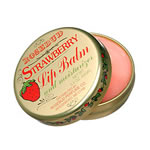The Rosebud Perfume Company was founded by Dr. George F. Smith in 1895 in Woodsboro, Maryland. Smith had originally been a teacher, but changed career paths and became a druggist in 1902. After friends and family members requested a salve for minor skin irritations, Smith concocted a “Balsam of Rosebuds,” which eventually became the famed Smith’s Rosebud Salve. After advertising in tabloids, Smith found himself running a bona-fide mail-order business for his rose salve, which has continued to be successful into the next century.
While one would imagine that a company with such a long history would have a much more fact-laden history, the truth is that the company has enjoyed uncomplicated success by offering effective, simple products.
To this day, the company has a small catalog that consists of only five (wonderful) products: the original Rosebud Salve is wonderful for minor skin irritations, diaper rash, chapped lips, and dry skin.
The Strawberry Lip Balm is wonderful for chapped lips and dry cuticles, and the smell is heaven. It reminds me of being a wee lass growing up in the mint and corn fields of Idaho, getting skinned knees and dirt in the skirt. Don’t ask me why the smell of strawberries makes me think of these things, but it does, and I love it!
 Smith’s Mentholated Salve is a cooling formula that is great for the dry-nose-syndrome one gets from blowing the nose too often, as well as insect bites, allergic reactions, and minor burns. Rosebud Perfume has also formulated two other products, exclusively for Sephora: the Minted Rose Lip Balm and the Brambleberry Rose Lip Balm, both of which have delicate, sweet aromas and are excellent lip moisturizers.
Smith’s Mentholated Salve is a cooling formula that is great for the dry-nose-syndrome one gets from blowing the nose too often, as well as insect bites, allergic reactions, and minor burns. Rosebud Perfume has also formulated two other products, exclusively for Sephora: the Minted Rose Lip Balm and the Brambleberry Rose Lip Balm, both of which have delicate, sweet aromas and are excellent lip moisturizers.
All the ingredients in these salves are natural, save one: petrolatum. The petrolatum used in Rosebud Products is medical grade; however, the company itself, in addition to the public, has not been given a straight answer one way or another as to whether or not petrolatum itself is entirely toxin-free or without possible side effects.
Concerns with using petroleum-based products are stem from the fact that certain grades of it can contain chemical impurities and that the FDA does not regulate grades or quantities of petrolatum used in personal care products. Furthermore, manufacturers would have no legal issues with using any type of petrolatum they wanted in the creation of their products (www.health-report.co.uk/petroleum_petrolatum_health_concerns.htm).
In Europe, petrolatum has been banned, as of September 2004; in the use of cosmetic products unless it can be proven that it was not created from a carcinogenic substance.
According to Wikipedia, petrolatum should not be used in the nasal passages as it can cause a condition called lipid pneumonia, which causes an inflammatory response in the lungs—which means I will no longer be cramming Vaseline up my nose when I go to my mom’s house in the mountains.
 In terms of what, precisely, “medical grade” petrolatum is, Linda Pruitt, the Vice President of Rosebud Perfume Company assures me: “The term medical grade simply means surgical grade or pure white petrolatum. It is made in an FDA approved plant…Petrolatum was used on the terrible burns and cuts on the soldiers in the civil war. It is one of the best ingredients to form a protective barrier for scalds, burns or chaffing…There are many forms of petrolatum. Some of them are very crude; this is not the case in the Rosebud products.”
In terms of what, precisely, “medical grade” petrolatum is, Linda Pruitt, the Vice President of Rosebud Perfume Company assures me: “The term medical grade simply means surgical grade or pure white petrolatum. It is made in an FDA approved plant…Petrolatum was used on the terrible burns and cuts on the soldiers in the civil war. It is one of the best ingredients to form a protective barrier for scalds, burns or chaffing…There are many forms of petrolatum. Some of them are very crude; this is not the case in the Rosebud products.”
According to cosmeticdatabase.org, Smith’s Rosebud Salve scores a 1 (on a scale of zero to 10, 10 being extremely hazardous), earning it a “low hazard” ranking. So it seems that the hype surrounding the use of petrolatum is pretty inconclusive at this point, but it does seem that it is a good idea to keep it out of your nose. I think I can handle that!
At 7 bones per tin, you really can’t lose with this vintage, high-quality product. It has lasted this long, and will surely keep on truckin’, and if years on the market are any indication of a useful product, then rest assured this will be a good $7 investment for your skin and lips!

